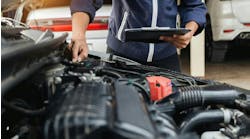As more and more vehicle applications become managed by computers, shop owners and technicians are struggling with the issue of charging for their diagnostic time. And while the vast majority of those in the automotive aftermarket agree that the diagnostic fees are necessary, there is no hard-and-fast consensus about the manner in which customers should be billed for these services.
"The common way that techs are paid is for what they produce," says George Witt, owner of George Witt Service, Inc. in Lincoln, Neb. "If you don't pay your techs, what do you expect them to produce?"
Witt, who is also an AMI instructor and a savvy businessman, agrees wholeheartedly with the concept of charging for diagnostics scans. And he doesn't mince words when he explains his point of view.
"The "D" word is the equivalent to most consumers of a wallet-dectomy," he says. "I advocate never using the word 'diagnostics' when talking with your customers. In this business, it's a loaded term. I've found, however, that people are willing to pay for testing or inspections, so I suggest using those terms instead."
Witt says that many consumers are turned off by the term diagnostics simply because they think the advanced testing doesn't work. And, if they've had a prior negative experience with a shop that did not explain the diagnostic charges completely, their fears are even more difficult to allay.
"It's all about educating the customers, so that they can understand what they are being charged for," adds Amy Mattinat, owner of Auto Craftsman in Montpelier, Vt. "Customers are already skittish when they come into a repair shop, but when you add computers to the mix they become even more uncomfortable. You have to let your customers know what is going on so that they can make an informed decision about their vehicle's repair."
The true cost of a diagnostic scan
Still, why should a shop charge for diagnostic repair? It often comes down to what a shop has paid to train their technicians, as well as the cost of the diagnostic equipment.
"Every year we have to update our old equipment or buy new equipment," says Dan Guido, owner of Tony's Service Center in Phoenix, Ariz. "You can't turn the old equipment back in, and you can't be reimbursed for a previous purchase. It's a big commitment for a shop to invest in diagnostic equipment. Charging the customer for this service is necessary to offset that cost."
Mattinat agrees: "You have to pay for software updates for your scanners all the time. And you have to buy the software for every make and model that you service. Charging your customers a fee for diagnostics pays for having up-to-date software in your scanner and allows you to do your job."
"When you're doing diagnostics, you generally have your best guys on it," Witt adds. "And these guys need more than a pair of pliers to do the job. So if I've spent money training my techs on how to use the most expensive equipment in my shop, what possible business basis do I have for sending that guy out for nothing?"
Still, consumers have a hard time understanding what they can't see, and diagnostics is something that is not visible to the naked eye. "Consumer pressure often forces shops into either not charging for diagnostics, or not charging enough for their time," says Tom Ham, owner of Ham's Automotive in Grand Rapids, Mich. "Or, they simply shortcut it and don't do it at all. But you can't fix a car with guesswork. The whole thing will deteriorate into a big mess."
Consider the onion, Mattinat says. It has layers — just like a computer. Diagnosing a problem is difficult because often you expose one layer, only to find that you need to go in an opposite direction. Then you peel back another layer, and another, and hope you find the problem sooner rather than later. But you have to charge for each layer of diagnostics — and you have to make your customer understand that each of these layers represents the increasing difficulty of the problem being diagnosed and the increasing skill of the technician doing the diagnosis.
From a tech's perspective
But charging for diagnostics is not just a sound business move; it also lets the technicians know they are a valued team player.
"It's a slap in the face of the technician if you don't compensate him for his diagnostic time," Guido says. "If I was a technician, this would be a hard and fast condition of my employment."
To get some real-time feedback, Mattinat stepped away from her desk to interview the technicians in her shop's bays. When asked what they thought about the whole issue, Mattinat's lead technician responded vehemently. "Am I working when I'm doing diagnostics?" he asked. "Of course I am! Then I need to get paid for it."
Mattinat backs her employee's response 100 percent. "A technician needs to get paid for his expertise. Just because he knows the answer and can solve a problem quickly doesn't mean he shouldn't be compensated for his time. In fact, the opposite is true. Your best tech has spent hours working on cars in order to learn how to solve problems quickly and efficiently. You want to reward him for his hard work."
Witt offers a different perspective on the subject for more stubborn consumers. He compares technicians to plumbers and electricians, who are paid to show up and diagnose problems before they even begin a repair.
"Too many people in our industry want to compare us to doctors," he says. "To me, that's stupid. It's more accurate to compare us to plumbers and electricians, but those guys make more money than we do. We can't do stuff for free — we have to get in the habit of charging for what we know."
Educating the consumer
But driving home this point to the consumer can often be a tricky business. How you go about doing it may differ, depending on what part of the country you're in and your customer demographic, Ham says.
"The best way to figure out what to charge is to survey the competition and figure out what's a reasonable price for services in your particular area," he says. "After that, the charge just requires an honest, straightforward explanation. Take the time to explain things to your customer — hurrying is often one of the biggest problems that comes up when explaining diagnostic charges."
Communication is key when explaining the charges, says Guido, who advocates breaking the charge down to explain everything that goes into a diagnostic reading, including what the technician had to learn to be able to run the scan, how many hours it took to research the problem online after obtaining a code and what equipment went into doing each part of the job.
Witt agrees: "If we separate this process into more than one step and show the customer exactly what is involved, they are willing to understand why it costs what it costs to service their vehicle."
To sum up, give the customer something they can see and explain step-by-step what goes into a diagnostic scan, and the debate over charging for services will disappear.
"Just because you don't have a wrench in your hand doesn't mean you shouldn't charge for your time," Witt concludes. "We need to do a better job helping our customers understand that."


